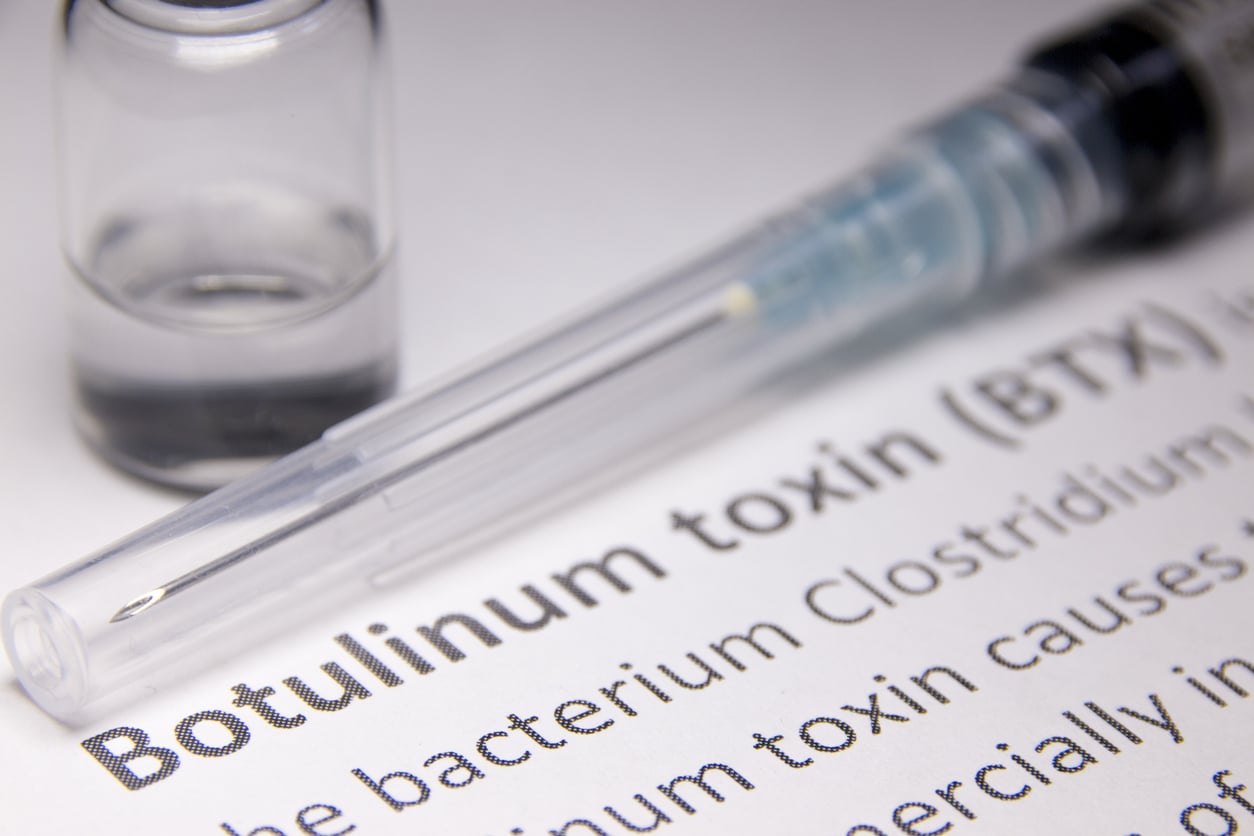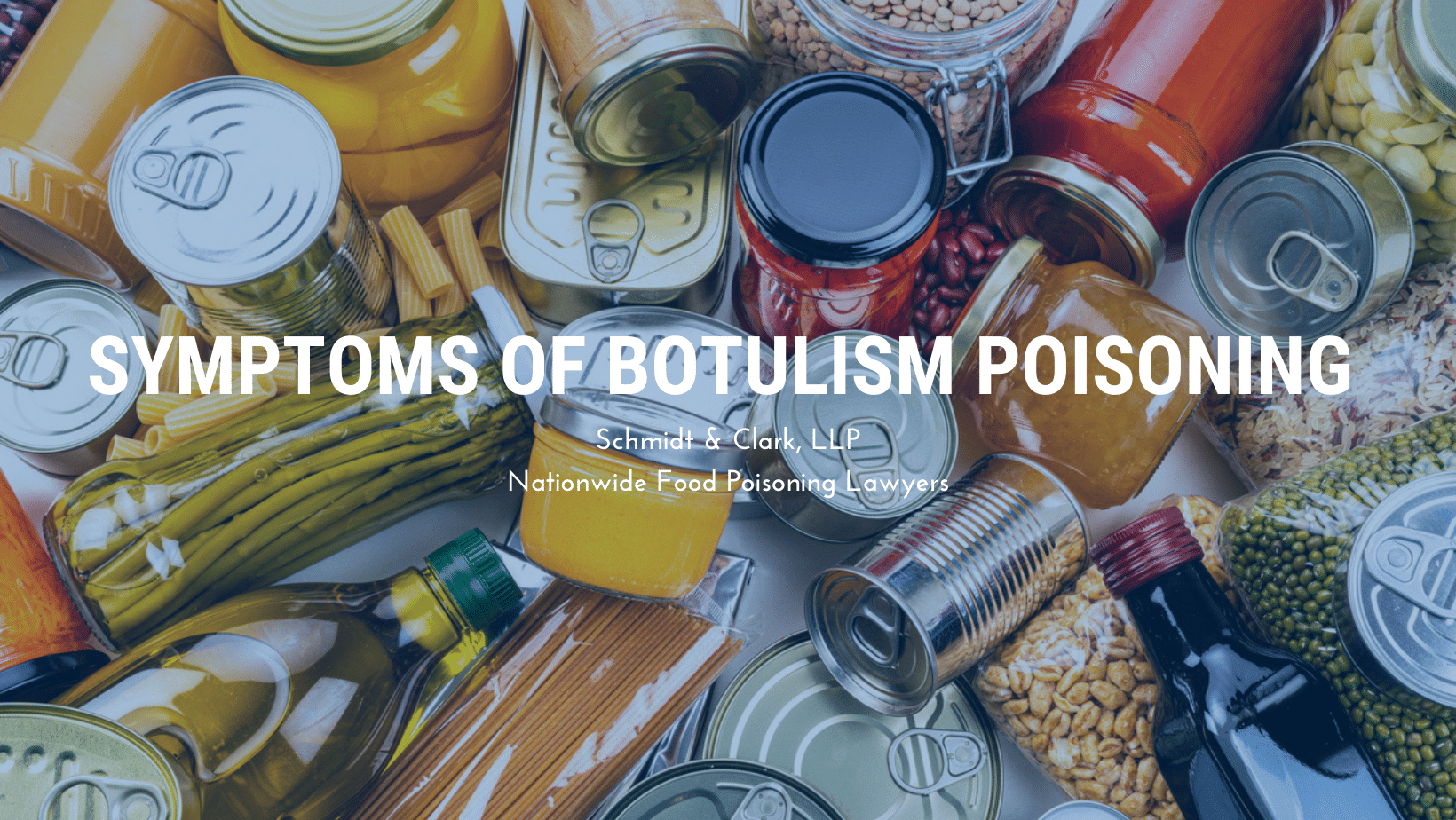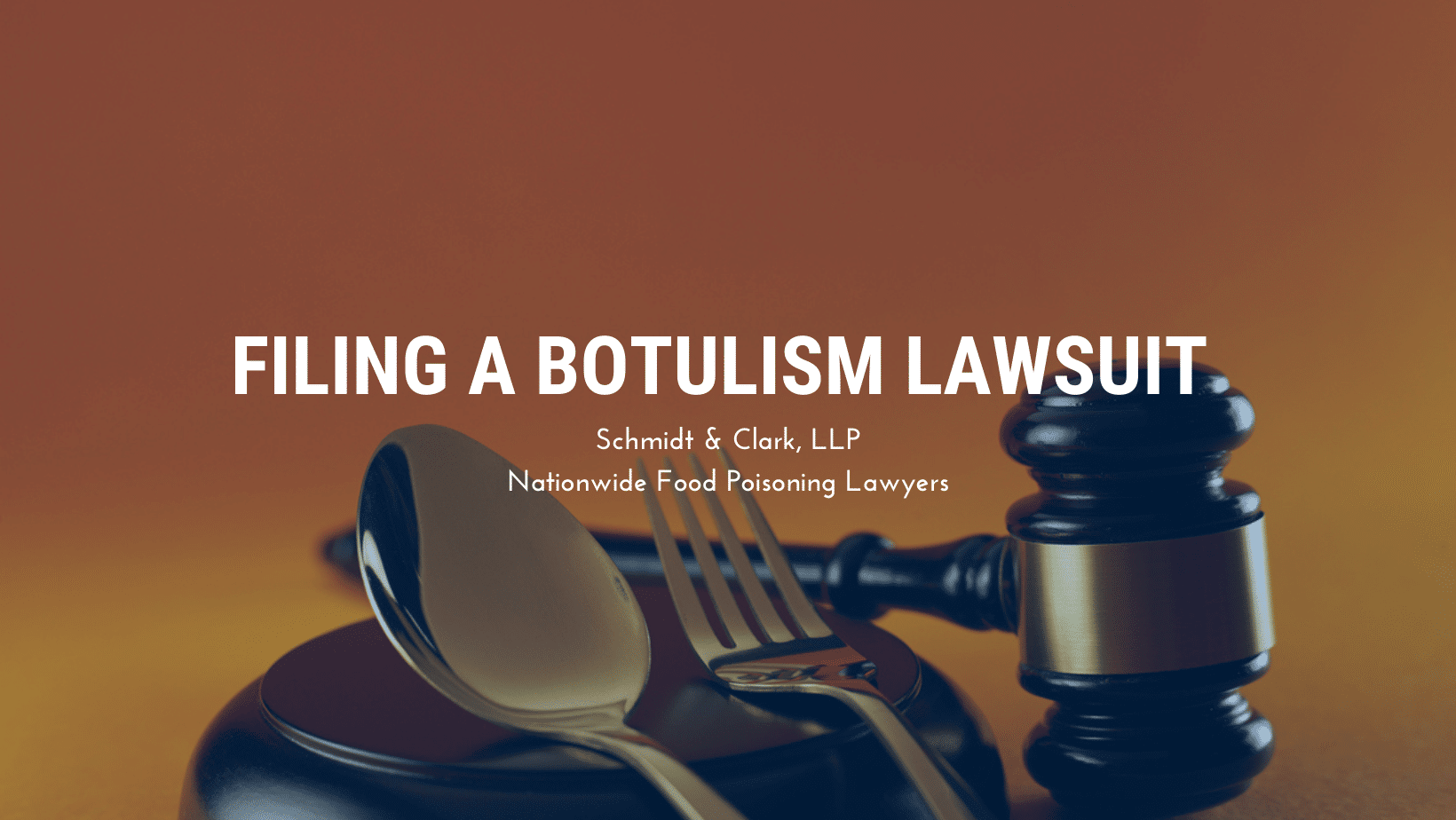Outbreaks of botulism, a rare but extremely serious muscle-paralyzing disease that can lead to death, have been linked to negligence during the manufacturing or preparation of food products.
The Botulism Lawyers at Schmidt & Clark, LLP, are reviewing potential food poisoning lawsuits for individuals who were diagnosed with botulism after consuming or being exposed to contaminated food.
You may be entitled to compensation by filing a Botulism lawsuit and we can help. Please click the button below for a Free Consultation or call us toll-free 24 hrs/day for legal advice by dialing (866) 588-0600.
If you or a loved one experienced paralysis, respiratory failure, or other serious complications following consumption of contaminated food products, you may be entitled to pursue compensation.
At Schmidt & Clark, LLP, we are dedicated to helping individuals who have suffered due to botulism poisoning. Our experienced legal team is here to guide you through the process and fight for the compensation you deserve.
Contact Schmidt & Clark, LLP today for a free, no-obligation consultation.
Table Of Contents
- Botulism Poisoning Outbreak Lawsuit Overview
- Latest Botulism Poisoning Outbreak Lawsuit Updates
- FDA Reports and Statistics
- Botulism Injuries & Side Effects
- Do You Qualify for a Botulism Lawsuit?
- Statute of Limitations for Botulism Poisoning Outbreak Lawsuits
- FAQs
- 1. What is botulism?
- 2. How are most cases of botulism caused?
- 3. What are the symptoms of botulism?
- 4. Can I sue a restaurant if I contracted botulism from food served there?
- 5. What should I consider before settling a botulism lawsuit?
- 6. Can I sue for pain and suffering if I experienced severe symptoms from botulism?
- 7. What should I do if I suspect a food product I consumed is part of a botulism recall?
- 8. How is botulism treated?
- 9. How can botulism be prevented?
- 10. How long can you live with botulism?
- Get a Free Botulism Poisoning Outbreak Lawsuit Evaluation With Our Lawyers
Botulism Poisoning Outbreak Lawsuit Overview
Botulism lawsuits involve cases against food manufacturers or restaurants whose negligence during food preparation or manufacturing led to botulism poisoning.
These lawsuits allege that contaminated food products contained the toxin produced by Clostridium botulinum bacteria, resulting in serious illness.
Botulism outbreaks are considered a public health emergency and must be reported to the U.S. Food & Drug Administration (FDA).
Latest Botulism Poisoning Outbreak Lawsuit Updates
- July 1, 2025: The FDA issued warning letters to multiple companies for selling canned dessert products without adequate controls to prevent botulism-causing contamination, posing serious risk of illness [4.]. Simultaneously, several dietary supplement manufacturers received warnings for making unapproved drug claims, such as treating or preventing diseases, which violate federal labeling regulations. These enforcement actions signify the agency’s renewed efforts to crack down on food and supplement safety violations to protect consumers.
- June 23, 2025: More than 40 cases of botulism linked to Botox injections were reported in the U.S. and U.K. over the previous two months, with at least seven hospitalizations and a Kentucky med spa pleading guilty to using illegally imported Botox [1].
- September 17, 2023: Fifteen suspected cases of botulism, including ten laboratory-confirmed, were identified across seven countries after consuming canned sardines at a Bordeaux, France restaurant; thirteen were hospitalized, six required mechanical ventilation, and one person died [2].
- July 2023: A dozen cases of botulism were reported in Spain, linked to vacuum-packed or modified atmosphere prepared foods; seven people were hospitalized and four required intensive care, prompting a product recall and suspension of production by the implicated food company [3].
FDA Reports and Statistics
Botulism outbreaks are considered a public health emergency and must be reported to the FDA. According to the CDC, “All forms of botulism can be fatal and are considered medical emergencies. Foodborne botulism is a public health emergency because many people can be poisoned by eating a contaminated food [1].”
Botulism Injuries & Side Effects
Botulism is a rare but extremely serious muscle-paralyzing disease that can lead to death. The disease is caused by the toxin produced by Clostridium botulinum.
- Progressive weakness: Paralysis of the legs, arms, trunk, or respiratory muscles
- Digestive symptoms: Nausea, vomiting, abdominal cramps
- Communication difficulties: Difficulty swallowing, difficulty speaking
- Vision problems: Double vision
- Respiratory issues: Difficulty breathing, potentially requiring mechanical ventilation
Do You Qualify for a Botulism Lawsuit?
You may qualify for a Botulism lawsuit if:
- You consumed food contaminated with Clostridium botulinum toxin.
- You experienced serious side effects including progressive weakness, paralysis, difficulty breathing, or other botulism symptoms.
- The injuries required medical treatment or hospitalization.
- You can provide medical documentation linking your injuries to botulism poisoning.
Evidence Required for a Botulism Poisoning Outbreak Lawsuit
- Medical documentation confirming botulism diagnosis
- Proof of consumption of the contaminated food product
- Medical records detailing treatment and complications
Damages You Can Recover
- Medical expenses for hospitalization and ongoing treatment
- Lost wages due to inability to work
- Pain and suffering from temporary or permanent paralysis
- Other complications related to botulism poisoning
Statute of Limitations for Botulism Poisoning Outbreak Lawsuits
Time limits apply for filing botulism lawsuits. Contact our attorneys immediately to ensure your claim is filed within the applicable statute of limitations in your state.
FAQs
1. What is botulism?
Botulism is a rare foodborne illness caused by the toxin produced by the bacterium Clostridium botulinum. The toxin produced is considered the most lethal nerve toxin known to man. The toxin paralyzes the nerves it contacts, restricting the muscle’s ability to contract, which can lead to respiratory and musculoskeletal paralysis.
2. How are most cases of botulism caused?
Clostridium botulinum bacteria can be found in soil and untreated water worldwide. It creates spores that live in improperly preserved or home-canned foods. Common sources include low-acid home-canned foods, honey, cured meats, herbs in oil, and improperly stored foods.
3. What are the symptoms of botulism?
Symptoms typically appear 8 to 36 hours after eating contaminated food and include progressive weakness, nausea, vomiting, abdominal cramps, difficulty swallowing and speaking, double vision, and difficulty breathing.
4. Can I sue a restaurant if I contracted botulism from food served there?
Yes, you can sue a restaurant if you contracted botulism from food served there. The restaurant may be held liable for serving contaminated food, especially if they failed to follow proper food safety protocols. Compensation can cover your medical expenses, lost wages, and other damages.
5. What should I consider before settling a botulism lawsuit?
Before settling a botulism lawsuit, consider the full extent of your medical expenses, future treatment costs, lost wages, and the impact on your quality of life. Ensure the settlement offer covers all these aspects, and consult with your lawyer to evaluate whether the offer is fair and adequate
6. Can I sue for pain and suffering if I experienced severe symptoms from botulism?
Yes, you can sue for pain and suffering if you experienced severe symptoms from botulism. These non-economic damages compensate for the physical pain, emotional distress, and reduced quality of life caused by the illness.
7. What should I do if I suspect a food product I consumed is part of a botulism recall?
If you suspect a food product you consumed is part of a botulism recall, stop consuming the product immediately, preserve any remaining food for testing, seek medical attention if you experience symptoms, and consult with a lawyer to discuss your legal options.
8. How is botulism treated?
Treatment includes administration of antitoxin to block circulating toxin, possible removal of remaining food in the system, mechanical respiratory support if needed, and intravenous fluids and nutrition. Recovery can take weeks or months of medical attention.
9. How can botulism be prevented?
Prevention methods include avoiding preserved food with bulging containers or spoiled smells, proper home canning procedures, refrigerating oils infused with garlic or herbs, proper handling of foil-wrapped potatoes, boiling foods for 10 minutes to destroy toxins, and never giving honey or corn syrup to infants.
10. How long can you live with botulism?
While death from botulism has become rare over the past 50 years, severe cases may require mechanical ventilation and intensive medical care for several months to survive.
Get a Free Botulism Poisoning Outbreak Lawsuit Evaluation With Our Lawyers
Time is limited to pursue legal action for botulism poisoning. State laws impose strict deadlines on food poisoning lawsuits.
The Food Poisoning Litigation Group at Schmidt & Clark, LLP offers:
- Free, confidential consultations.
- No upfront costs or fees.
- Payment only if we win your case.
References
- https://extension.colostate.edu/topic-areas/nutrition-food-safety-health/botulism-9-305/
- https://pmc.ncbi.nlm.nih.gov/articles/PMC10668258/
- https://www.foodsafetynews.com/2025/02/spanish-botulism-outbreak-prompts-report-on-risks/
- https://www.foodsafetynews.com/2025/06/fda-issues-warning-letters-about-botulism-risk-in-canned-desserts-and-illegal-drug-claims-in-supplements/

 Published by
Published by 

